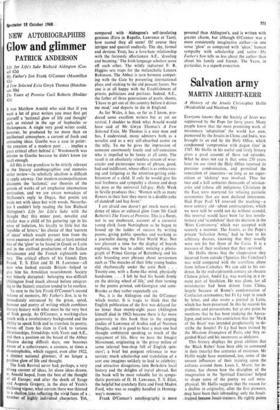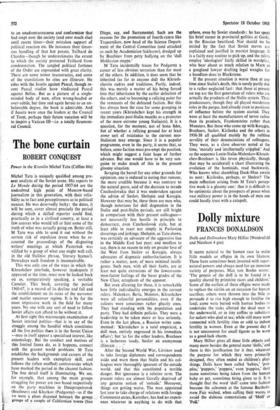Salvation army
MARTIN JARRETT-KERR
Everyone knows that the Society of Jesus was suppressed by the Pope for forty years. Many people know that the most promising work of missionary 'adaptation' the world has seen, pioneered by the Jesuits in China and India, was brought to an end by the Holy Office, which condemned 'compromise with pagan rites' in 1707. Mr Hollis in his useful and lively history gives a good account of these sad episodes. What he does not say is that some 250 years later (in our time) the Holy Office reversed its previous condemnation, and permitted the veneration of ancestors—so long as no super- stition or 'idolatry' was involved. Thus for two and a half centuries thousands of mission- aries and (above all) indigenous Christians in the East were martyred for refusing patriotic ceremonies that are now declared innocuous. Had Pope Paul VI reversed the teaching—a mere century old—about contraceptives, which we were told he could not do without scandal, this reversal would have been far less revolu- tidnary and 'scandalous' than the decision in the 'Rites Controversy' which was accepted with scarcely a murmur. The Jesuits, as the Pope's private 'Salvation Army,' had to bow to his arbitrary decrees, knowing that they usually were not his but those of the Curia. It is a measure of their resilience that they survived.
Mr Hollis shows that the vituperation they incurred from outside ('Ignatius His Conclave') was mild compared with the scurrilous abuse from fellow-Catholics. We can add to his evi- dence. In the mid-eighteenth century an obscure Chinese priest, Andre Ly, was working in a re- mote part of Szechilan. He was alone, for all missionaries had been driven from China, largely because of Rome's condemnation of Confucian ceremonies; but Fr Ly kept in touch by letter, and also wrote a journal in Latin, which has been preserved. In this he records his problems and persecutions; but at one point he mentions that he has been studying the Apoca- lypse, and notes as his conviction that the 'Mark of the Beast' was intended prophetically to de- scribe the Jesuits! Fr Ly had been trained by the Missions Etrangeres of Paris, and they re- garded Ricci and his successors as idolaters.
This history displays the great abilities that the 'Black Robes' have been able to command in their (nearly) five centuries of existence. Mr Hollis might have mentioned, too, some of the unseen influences of their training upon the cultures around them. Louis L. Martz, for in- stance, has shown how the discipline of the imagination in the 'Spiritual Exercises' helped to shape some of• the poetry we call meta- physical. Mr Hollis suggests that the reason for a decline in originality, after the first pioneers, ,may have been their inbreeding; only the Jesuit- trained.beasase Jesuit-trainers. He rightly points to an unadventurousness and conformism that bad crept over the society (and over much else) until recent times—their mistaken support of political reaction etc. He instances their timor- ous handling of that hot potato, Teilhard de Chardin—though he underestimates the extent to which the society protected Teilhard from condemnation. The tangled political fortunes of the Order are expounded with great clarity. There are some minor inaccuracies, and some of the translations he cites are illiterate. He sides with the Jesuits against Pascal, though re- cent Pascal studies have vindicated Pascal against Balm. But as a picture of a single- minded body of men, often wrong-headed or over-subtle, but time and again heroic to an un- believable degree, the book is admirable. And if Jesuits were once the leaders at the Council of Trent, perhaps their future vocation will be to inspire a Vatican III—i.e. a totally Ecumeni- cal Council.







































 Previous page
Previous page